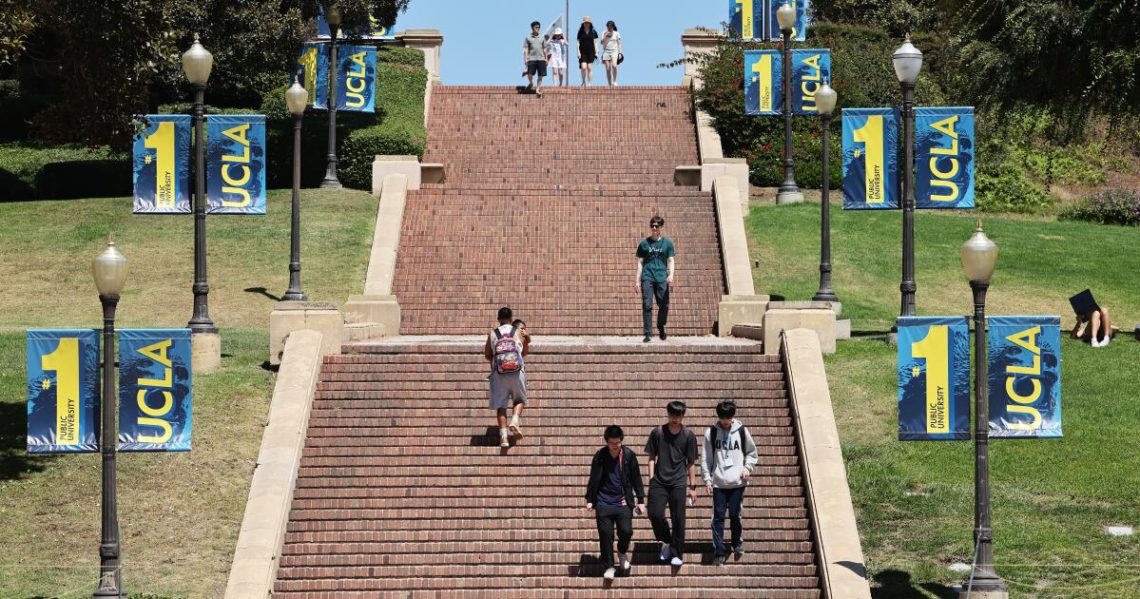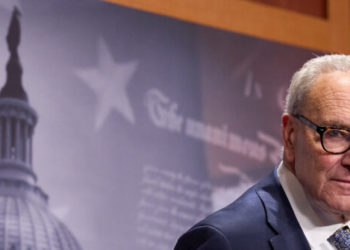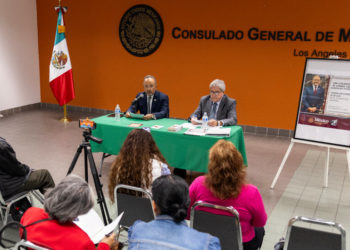Top UC leaders will attempt to negotiate a settlement with the federal government and have identified guardrails to protect the nation’s premier public university system after the Trump administration cut more than half a billion dollars in UCLA research grants and demanded a $1-billion fine to atone for antisemitism, according to high-placed UC officials.
The talks with the Justice Department are just beginning and so far involve 10 of the 24 UC regents, including chair Janet Reilly and UC President James B. Milliken. The group held its first publicly announced meeting last week after an emergency convening of all regents Aug. 11.
The negotiations come amid a volatile political backdrop as Gov. Gavin Newsom takes on President Trump in a high-stakes redistricting fight over congressional control and unleashes an audacious social media strategy of Trump-directed insults. In response to actions against UCLA, Newsom publicly announced “we’ll sue” — and called the demands “extortion” and “ransom,” saying California will not “bend the knee” to Trump.
But the decision to go to court and negotiation strategy rests with UC leaders and regents, who operate independently under the state Constitution. Newsom, however, is an ex-officio board member with voting power and influence.
The Justice Department last month set a Sept. 2 deadline, saying it is also ready to sue if there is not “reasonable certainty” that the sides can reach an agreement.
The department did not respond to inquiries from The Times about the status of its suit.
“The political pressure and stakes are huge for UC’s board of regents, a new UC-wide president, the campus chancellors and faculty leaders — and the state of California,” said John Aubrey Douglass of the UC Berkeley Center for Studies in Higher Education, who has written extensively on UC history and politics. “Anything could happen.”
UC leaders pore over Trump demands
In addition to the mega-fine that far eclipses those at Ivy Leagues, the Trump administration wants big changes at UCLA: restrictions on protest rights, an end to race-related scholarships and certain other programs, the elimination of transgender-friendly policies in bathrooms and sports; and the release of admissions data that it believes will prove UCLA illegally considers race when awarding coveted seats.
The Times spoke to four senior UC officials about the deliberations, who explained the contours of the university’s approach. They were not authorized to talk on the record, and cautioned that the early picture could quickly shift.
Decisions on how to respond are being made at the highest levels involving the Oakland-based general counsel’s office, Milliken, and the regents. UC is also contacting outside counsel.
UCLA Chancellor Julio Frenk is regularly giving input, and leaders are also talking to other chancellors and state and federal government advocacy staff in Los Angeles, Sacramento and Washington, D.C. But the most crucial discussions are happening at top levels because the outcome could affect all of UC.
UC has communicated with the Justice Department in recent weeks, although negotiations are early in the process.
Leaders have made it clear that a $1-billion payout is a no-go. Another red line for several UC officials is the federal request that the university submit to an outside monitor over an agreement.
There are government asks to which some UC leaders could possibly agree, encompassing efforts already underway.
They include protest restrictions; UC has a “zero tolerance for” encampments. Others are a commitment to ensure equal access to campus grounds and facilities for all students, including Jews — an issue UC addressed in a settlement last month with students who sued over last year’s pro-Palestinian encampment.
As part of a settlement, the university could easily re-emphasize its March ban on requiring “diversity statements” in faculty hiring. UCLA has rejiggered retention programs for nonwhite students, with laid-off staff told changes were made to comply with anti-diversity, equity and inclusion federal priorities. Some department-level programs this year removed “diversity” language from their names or websites to avoid government scrutiny.
On gender identity, UCLA is a member of the National Collegiate Athletic Assn., which bans transgender women on women’s teams.
While the idea of paying the government is unappealing, some UC leaders have indicated that other less costly monetary arrangements are more palatable.
They point to the July UCLA settlement, in which the university agreed to donate more than $2 million to Jewish nonprofits. They have also taken note of a Trump agreement with Brown University, where it said it would give $50 million to workforce programs, and a possible Trump deal with Harvard that would funnel money to educational and vocational programs.
University leaders want any deal to cover all UCs in order to close federal investigations on antisemitism, admissions and other areas affecting campuses including Irvine and Berkeley.
A lawsuit, as desired by Newsom, is not off the table.
“The regents will make this decision with the input of the governor,” said former regent George Kieffer, who chaired the board during the first Trump administration and ended his term in 2021. Kieffer, who is not involved in negotiations, worked with Newsom when he regularly attended regents meetings as lieutenant governor.
“I have full confidence in the board chair of the board of regents and the board to do what is the best of the university,” Kieffer said. “I also have confidence that the governor will be coordinating with them.”
New UCLA cutbacks
In the meantime, more than $500 million in health and energy research grant funds are still missing at UCLA weeks before the fall quarter begins and 48,000 students arrive along with thousands of faculty and staff.
Already, the ramifications of the grant suspensions are taking toll.
Last week, UCLA announced a pause on faculty hiring for the academic year, formalizing directives departments began receiving last month. With few exceptions for critical areas, only positions where offers have already been made can be filled. Leaders signaled that more belt-tightening was on the way, saying they would speed up plans to consolidate IT teams and streamline other administrative functions to funnel limited funds to teaching and research.
Professors are calculating how long science and medical research labs can stay open — some have three months left before downsizing. Faculty are exploring how student lab workers can remain employed, and making contingency plans for more cuts.
“Some of the decisions ahead will be difficult,” wrote Executive Vice Chancellor and Provost Darnell Hunt and Vice Chancellor and Chief Financial Officer Stephen Agostini in recent letter to faculty and staff.
Faculty, students make their voices heard
Nearly 200 law professors from across UC have signed a letter to regents that endorses Newsom’s battle against Trump and urges a “defense of the University of California’s rights in court.”
But at a recent UCLA Academic Senate town hall where 600 members heard from top administrators, faculty complained of feeling in the dark about the university’s next steps — and more practically, how to keep the lights on in labs.
Administrators said they were evaluating grants one-by-one to find ways to provide stop-gap funding, and working to ensure graduate and postdoctoral student education and research — often paid for by federal grants — went uninterrupted.
“We don’t know exactly at this point what that path will be” Hunt, the provost, said at the meeting, referring to where the university will land with Trump.
In an interview with The Times, faculty senate chair and political science professor Kathleen Bawn said the group’s priority is “ensuring that researchers with frozen grants are able to continue to do their work, that is, continue to expand knowledge in ways that improve the lives of everyone. And it means protecting academic freedom and faculty authority over the curriculum to ensure that the work we do is free from political interference.”
A smaller faculty organization — the UCLA Faculty Assn. — is also taking action.
Several members traveled to Sacramento last week, meeting with legislators to lobby for extra UCLA funding. The group, along with the Department of Neurology, will host a “suspended research fair” on Sept. 10 to showcase the projects — from Alzheimer’s to climate research — on the line.
“We’d like to prevent lab closures and staff reductions as quickly as possible while giving our administration some breathing room to make plans and decisions so as to not have to negotiate away our values,” said association President Anna Markowitz, an associate professor of education.
With the Trump administration charging UCLA of failing to address discrimination against Jewish community members, Jewish faculty are also chiming in. Hundreds signed a letter to the regents, saying the government demands were “misguided” and that grant cuts “do nothing to make UCLA safer for Jews.”
But the letter was missing signatures from many members of two major campus groups that have logged antisemitic incidents since the Oct. 7, 2023, Hamas attack on Israel led to protests in response to Israel’s war in Gaza: the recently disbanded UCLA Taskforce on Antisemitism and Anti-Israeli Bias, and the Jewish Faculty Resilience Group.
The Jewish Faculty Resilience Group said it wants UC to appoint an independent external group to monitor the university’s response to antisemitism complaints; expanded antisemitism training; and more funding to support courses and faculty who specialize in Jewish identity, Israel and Zionism.
The organization is pushing UC to adopt the the International Holocaust Remembrance Alliance definition of antisemitism. Opponents say it silences legitimate criticism of Israel. This year, Columbia and Harvard universities embraced the definition, which says calling Israel’s existence “racist” is antisemitic.
“UCLA was given the opportunity to act before this became a crisis. And that’s why we’re now sharing our recommendations publicly,” the group wrote this month as it released its requests. “…It outlines practical steps that the university can still take to address antisemitism without compromising academic freedom or inclusion.”
The post UC marks red lines as it moves to negotiate with Trump administration over $1-billion fine appeared first on Los Angeles Times.




